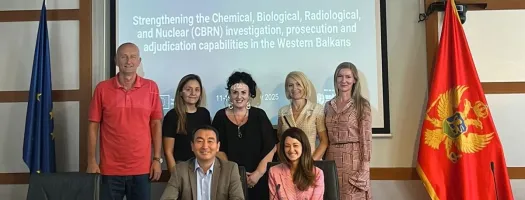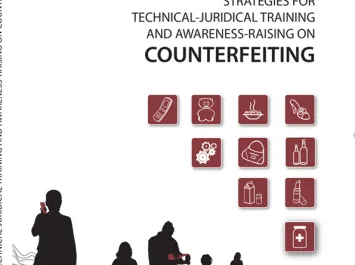A new pilot regional project under the European Union Chemical, Biological, Radiological and Nuclear (CBRN) Risk Mitigation Centres of Excellence (EU CBRN CoE) Initiative is set to enhance the capabilities of Western Balkans countries in investigating, prosecuting, and adjudicating crimes involving CBRN materials. Bosnia and Herzegovina, Montenegro, and North Macedonia will benefit from this targeted initiative, which aims to establish a comprehensive and sustainable framework for CBRN criminal justice.
The project, titled “Strengthening the CBRN Investigation, Prosecution, and Adjudication Capabilities” is the first of its kind to offer an end-to-end regional training model that connects frontline response with courtroom adjudication. It covers the full spectrum of CBRN crime management, from initial investigation at crime scenes to the final legal proceedings in court.
Key components of the initiative include the development of robust legal frameworks, the strengthening of specialized knowledge and laboratory resources, the deployment of advanced forensic tools, and the promotion of effective interagency collaboration. Regular practical exercises, such as tabletop simulations and drills, are also integral to the programme.
The training package encompasses all essential components for building strong criminal cases and is structured around five progressive modules:
• Tabletop Exercise: Mapping interagency coordination and identifying operational priorities, needs, and gaps.
• CBRN Criminalization Workshop: Understanding international legal frameworks and their domestic application.
• Building a Case for Prosecution: A step-by-step comprehensive training course guiding investigations and prosecutions from CBRN crime scene to courtroom.
• Mock Trial / Moot Court: Conducting simulated legal proceedings under national law.
• Train-the-Trainer (TTT): Empowering national institutions to ensure long-term sustainability and ownership.
A defining strength of the programme lies in its long-term vision. From the outset, national legal and judicial training institutions have been actively involved to ensure that the knowledge and skills acquired are not only transferred but also institutionalized within national systems.
In response to requests from partner countries, and under the umbrella of the EU CBRN CoE Initiative, comprehensive guidebooks titled Prosecutor’s Guide to CBRN Crimes were published in 2022 and 2024. These manuals were developed in close collaboration with relevant international organizations to align with global mandates and standards for the safe and secure management of CBRN materials.
The programme is designed to be completed within a six-month timeframe and requires firm commitment from beneficiary countries, including the nomination of relevant trainees and the integration of training outcomes into national structures.
This pilot project builds on earlier successful implementations in Moldova and Ukraine, which were completed in the first half of 2025. The Western Balkans will now benefit from the lessons learned and best practices from these efforts.
All three beneficiary partner countries in the Western Balkans, namely Bosnia and Herzegovina, Montenegro, and North Macedonia, have expressed strong support for this European Union CBRN Risk Mitigation Centres of Excellence Initiative. As part of the EU’s broader commitment to enhancing CBRN safety and security across its immediate neighbourhood, the project aligns closely with its regional strategic priorities.
The project is fully funded by the Foreign Policy Instruments Service of the European Commission and implemented by the United Nations Interregional Crime and Justice Research Institute (UNICRI), reaffirming the EU’s commitment to strengthening global CBRN risk mitigation and justice systems.



